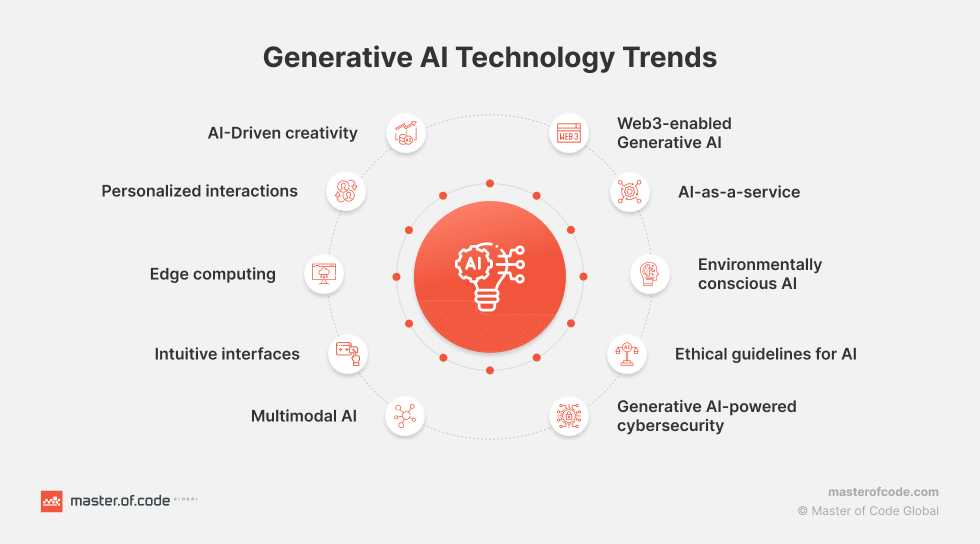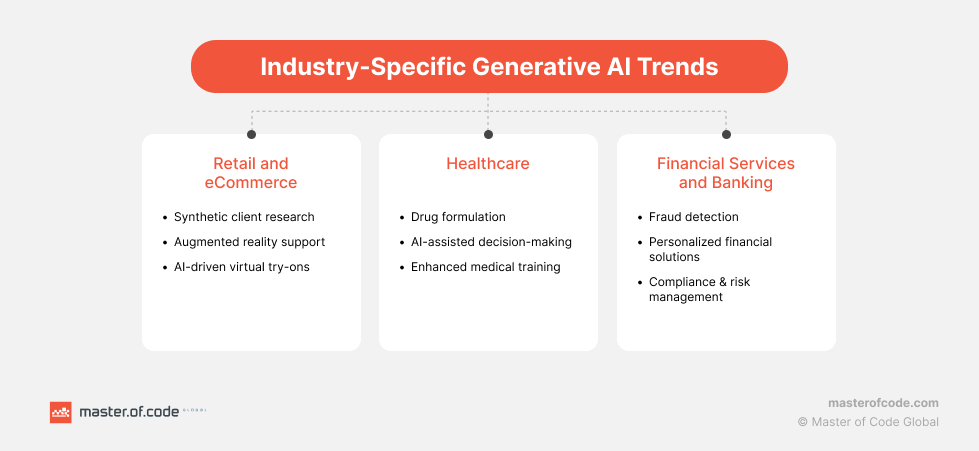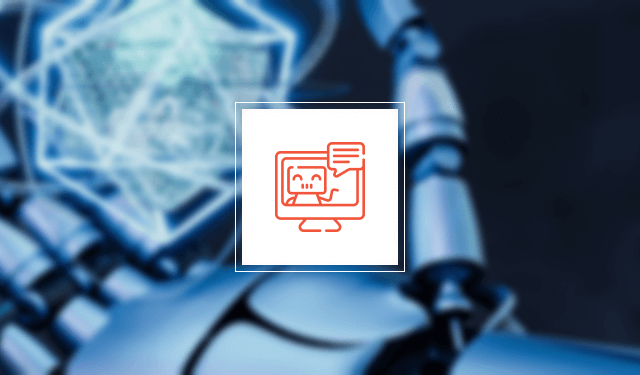Generative AI is an extremely versatile tool that has found its application in various fields. Therefore, it has the potential to become “general-purpose technology.” Moreover, researchers hope to build artificial general intelligence (AGI). Thus, it can turn into a machine that can perform any task that a human can.
Let’s explore executives’ anticipations about Generative AI trends for 2024 and beyond:
- 77% of businesses expect the largest impact from Generative AI among emerging technologies;
- Over 60% of respondents see it as a chance to gain a competitive edge;
- 73% believe new technology will boost workforce productivity;
- 71% plan to implement it within two years. IT/tech (56%) and operations (56%) are priority areas. They are followed by marketing and sales (42%), and customer service (40%);
- 64% expect it to confer a competitive advantage;
- By 2026, companies focusing on responsible AI could enhance business goal achievement and user acceptance by 50%;
- Artificial intelligence disruption may increase global labor productivity by 1.5%-3.0% annually over the next decade.
In this transformative era, several key trends are shaping the Generative AI landscape:
- AI-driven creativity shaping diverse art forms and cultural expressions;
- Personalized interactions and experiences for heightened engagement;
- Edge computing enabling rapid real-time data processing;
- Intuitive interfaces for seamless human-AI collaboration;
- Multimodal artificial intelligence integrating diverse data types for comprehensive understanding;
- Web3-enabled Generative artificial intelligence for decentralized and secure applications;
- AI-as-a-service providing scalable and accessible solutions;
- Environmentally conscious artificial intelligence promoting sustainable practices;
- Ethical guidelines ensuring responsible and trustworthy deployment.
As businesses navigate new technologies, they face diverse scenarios for Generative AI’s future. It can be a utopian integration into everyday life. Or it can turn to a scenario where regulation hampers progress or public skepticism hinders adoption. The path forward for this technology is both promising and challenging.
Let’s now explore each Generative AI trend in depth, discovering their multifaceted impact.
Generative AI Trends Reshaping Business Landscapes

Text, Image & Video Generation
Generative artificial intelligence tools can produce diverse forms of content. These include written, image, video, audio, and coded materials. Businesses are actively exploring applications across these domains. Specialized applications customized for specific functions will offer greater value than generalized ones.
The trends in the landscape of Generative AI for text generation include:
- Models understanding human psychology and creative processes, leading to better connections with users;
- Creation of emotionally resonant and deeply engaging written content;
- Artificial intelligence adapts content to individual preferences, improving user interactions;
- Autonomy in undertaking complex tasks, in fields such as research and creative brainstorming;
- Use of AI-powered writing assistants for task automation.
In Generative AI for image creation, significant advancements are shaping the industry:
- Move towards realism and creativity, with highly detailed and lifelike images;
- Blurring boundaries between natural and synthetic visuals, transforming design;
- Higher adoption in entertainment and virtual reality industries;
- Empowering designers with tools to prototype and create diverse products.
Generative AI in video generation is poised to transform content creation and consumption:
- Production of high-quality, personalized videos for diverse purposes;
- Integration of AI video generators into existing workflows, targeting specific audiences;
- Higher accuracy of AI algorithms for generation of targeted videos;
- Reduction of time and costs associated with traditional video production methods.
As these trends unfold, innovation continues to push boundaries. It offers unprecedented possibilities for content creation and innovation across various industries, a point also made in the DepositPhotos report.
Music Generation
Generative AI is revolutionizing music creation. These AI models can mimic human voices and generate music. This offers endless possibilities for musicians and composers. In the music world, this new intelligence is becoming a go-to tool for songwriters.
They provide fresh compositions that inspire creativity. It’s not just about creating new music; AI is also shaping the way we experience it. Soon, we might have adaptive soundtracks in video games and live events. This will improve our audiovisual experiences in real time.
AI is on the verge of mastering human-like expression and emotion in voice synthesis. This advancement will open doors to real-time translation, audio dubbing, and automated voice overs. Musicians and audiences expect a future where music becomes an even more immersive and dynamic art form.
NLP Technology and Multimodal AI
Generative AI is also enhancing Natural Language Processing (NLP). Artificial intelligence will become better at understanding texts, speeches, and sentiments with greater depth. This advancement is pivotal for human-like interactions in voice assistants and chatbots. This allows companies to make user experiences more natural and smooth.
Traditionally, such models processed information from single modalities, limiting insights. However, multimodal deep learning allows models to discern relationships between different modalities. They can now translate text to images, images to videos, and vice versa.
This fusion proves highly effective, especially in complex fields like medicine. In healthcare, AI combines textual and visual data for more accurate assessments. In NLP, multimodal models help with language translation, sentiment analysis, and chatbot development.
Generative AI-Powered Chatbots
Generative AI improves conversational abilities and enables personalization and context-awareness. Chatbots powered by Generative AI can continuously learn from user interactions. Such an approach boosts their performance and understanding of consumer needs over time. Advancements in machine learning algorithms are equipping chatbots with emotional intelligence. This way bots can detect and respond to human emotions.
As a result, they provide more compassionate and personalized customer support. Generative AI-powered chatbots will integrate into Virtual and Augmented Reality experiences. This integration will enable users to engage with lifelike virtual characters. This will ensure highly immersive and interactive client interactions. The future holds realistic and engaging virtual environments powered by AI-based technology.
Thinking of incorporating Generative AI into your existing chatbot? Validate your idea with a Proof of Concept before launching. At Master of Code Global, we can seamlessly integrate Generative AI into your current chatbot, train it, and have it ready for you in just two weeks.
Key Trends in Generative AI across Different Functions
According to McKinsey, Generative AI holds immense potential. 75% of its value is concentrated in a few areas. These include customer operations, marketing & sales, and software engineering.
Hyper-Personalization
Generative AI is ushering in a new era of micro-targeting, enabling brands to deliver content, recommendations, and experiences tailored to each user’s unique preferences and behavior. From dynamic marketing campaigns to AI-curated product suggestions, the latest in Generative AI is making mass customization both scalable and seamless—transforming engagement across e-commerce, entertainment, and education.
Open Source in Generative AI
The rise of available frameworks is democratizing access to powerful tools and models. Developers now contribute to and benefit from large-scale community-driven innovations, accelerating experimentation and deployment. This shift is among the most exciting Gen AI latest developments, allowing organizations of all sizes to build, test, and fine-tune AI more affordably.
Agentic AI
Autonomous agents powered by generative models are emerging as a transformative force. These tools can perform complex tasks, collaborate, and learn from feedback in real time. As part of recent advancements in Generative AI, agentic systems are reshaping industries like customer support, research, and operations, offering a glimpse into AI that doesn’t just generate but acts.
AI Security and the EU AI Act
With growing digital capabilities comes increased scrutiny around safety and accountability. Regulatory efforts like the EU AI Act are setting global precedents for how Gen AI systems should be governed. Security is now a top priority, with organizations investing in frameworks that ensure transparency, mitigate bias, and prevent misuse of generative tools.
Domain-Specific LLMs
General-purpose language models are powerful—but industry-specific LLMs offer sharper accuracy and contextual relevance. Trained on vertical-focused data, these models support specialized fields like legal, finance, or healthcare with expert-like precision. Businesses are turning to these tools to reduce error, ensure compliance, and gain competitive insights with targeted generative capabilities.
Customer Service
Generative AI in customer service is set to transform operations in the near future. Here are the key trends to be observed:
- Conversational search supporting instant, accurate responses from company knowledge bases;
- Agent assistance through search and summarization, improving conversation quality and trend categorization;
- Call center operational optimization. For example, automation of repetitive tasks, summarizing call center data for insights;
- Personalized recommendations through the analysis of the interactions. The result is customized content in preferred formats and tones.
This technology will significantly boost client experience, reducing response time, and increasing sales. Automation of consumer interactions will decrease human-serviced contacts by up to 50% . Such a method will boost productivity and lead to cost savings ranging from 30 to 45% as per recent AI statistics.
Marketing and Sales
Generative AI is transforming marketing and sales operations with the key trends being:
- Hyper-quick sales and marketing content creation;
- Automated repetitive tasks, like keyword research, administrative work, content formatting, and data analysis;
- Sales enablement and custom materials. For example, analyzing client’s profiles and creating tailored materials for enhanced sales success;
- Omnichannel strategy optimization to improve engagement;
- Customer insights with crm data through detection of patterns in user behaviors;
- Adjust training programs with custom training materials, role-play scenarios, and product knowledge sheets.
In sales, AI will identify leads, improve client engagement, and facilitate effective outreach. Such innovations can increase sales productivity by an estimated 3 to 5% . Moreover, Generative AI for marketing will act as a virtual collaborator, accelerating productivity. It will offer insights for knowledge work so the focus is on higher-impact tasks.
Software Engineering
Generative AI can revolutionize software engineering processes. Here is what it can help with:
- Streamline requirements gathering, aligning analyst-customer understanding and minimizing miscommunication risks through quick prototypes;
- Aid in UI template creation and ensure designs meet standards, enhancing application compliance;
- Generate code snippets in various languages. This boosts developer productivity and software quality without extensive programming knowledge;
- Craft diverse test cases and supports Dynamic Code Analysis (DCA) and chaos testing;
- Handle basic client queries, reducing issue resolution times and pressure on service personnel.
This shift will treat programming languages akin to natural languages. This enables its integration into pair programming and augmented coding. The potential impact on software engineering productivity could range from 20 to 45% as per recent Generative AI statistics. As a result, it reduces time spent on activities such as initial code drafts and corrections. Generative artificial intelligence can become a cornerstone of innovation in software engineering.
Generative AI Industries Trends

Retail and eCommerce
Retail and eCommerce are experiencing a surge in Generative AI-powered applications. The innovation transforms customer experiences and operational strategies.
Some of the current and future Generative AI in eCommerce and retail trends include:
- Accelerating consumer research and targeting with synthetic clients and scenario testing;
- Enabling real-time updates on products and preferences through Augmented Reality Support;
- Optimizing inventory management and trend analysis with AI insights;
- Enhancing consumer experience with AI-driven virtual try-ons;
- Streamlining marketing content creation through AI-generated drafts;
- Revolutionizing procurement operations with AI-assisted negotiation playbooks.
Executives’ expectations for Generative AI in retail:
- 66% for customer data analysis;
- 64% for inventory management;
- 62% focus on content generation to upgrade marketing and communication.
Examples:
- Shopify Sidekick bot aiding online store management;
- Stitch Fix’s AI-Based Ads;
- BloomsyBox eCommerce Chatbot;
- Amazon’s recommendation engine;
- Virtual Try On from Google
- Walmart Vendor Negotiations chatbot;
- Mercari’s Virtual Shopping Assistant Merchat AI.
Healthcare
Healthcare is at the forefront of AI innovation. The areas benefiting the most are drug development, patient monitoring, and telemedicine.
Key trends in Generative AI for healthcare include:
- Streamlining the selection of proteins and molecules for new drug formulation;
- Generating medication instructions, risk notices, and commercial content;
- Preparing scripts for physician interactions;
- Drafting legal documents incorporating specific regulatory requirements;
- Enhancing medical training;
- AI-assisted clinical decision-making.
Executives’ expectations for Generative AI in healthcare:
- 72% for medical records review;
- 70% for medical chatbots;
- 50% focus on image processing applications for surgeries.
Examples:
- Insilico Medicine leading the first Phase II trials for a Generative AI-developed drug with the help of Chemistry42, the Generative AI chemistry engine;
- DiagnaMed’s Brain Health AI Platform CERVAI™;
- Absci’s ML Models for In-Silico Antibody Design.
Financial Services and Banking
Financial services and banking are undergoing transformative changes through AI integration. The areas are fraud detection, risk management, and customer service automation.
Notable Generative AI market trends for financial industry encompass:
- Enhancing fraud detection and security protocols with AI;
- Implementing robust risk management solutions using AI-driven tools;
- Elevating customer service with chatbots and virtual assistants;
- Optimizing legacy code migration with natural-language translation;
- Automating customer emergency responses (e.g., credit card losses) with AI-driven IVR;
- Tailoring retail banking offers with personalized marketing content and A/B testing;
- Ensuring compliance with comprehensive risk model documentation;
- Implementing personalized investment options, fraud detection, and financial recommendations through AI solutions.
Executives’ expectations for Generative AI in banking and financial services:
- 76% for fraud detection;
- 68% for risk management;
- 66% focus on implementing chatbots and virtual assistants.
Examples:
- Morgan Stanley’s Chatbot for financial advisors to manage data;
- ChatGPT-Style CFO Tool from Brex for instant answer for financial questions;
- JPMorgan Chase’s AI Assistant IndexGPT for investment decision-making.
Cybersecurity & Generative AI
Using the power of Generative AI, cybersecurity can enter a new era of heightened defense. AI is capable of:
- Enhancing cybersecurity through AI-driven threat analysis and predictive modeling;
- Improving code security with AI-assisted code reviews and vulnerability assessments;
- Streamlining incident response by automating threat identification and mitigation;
- Enhancing phishing detection and prevention using AI-powered email security solutions;
- Utilizing it for real-time monitoring and analysis of user behavior patterns;
- Enhancing network security with AI-driven intrusion detection and prevention systems;
- Automating malware analysis and simulation for proactive defense strategies;
- Integrating AI into security information and event management for advanced threat intelligence;
- Enabling AI-driven security awareness training for employees to mitigate social engineering threats;
- Utilizing new tools for adaptive and context-aware access control systems.
These advancements can bolster security measures and create a safer digital environment. Therefore, AI-powered tools ensure businesses and individuals stay protected against evolving threats.
Ethics in Generative AI Application
The landscape of Generative AI ethics is evolving rapidly. Intellectual property protection stands as a cornerstone, demanding clear regulations. These include patents and copyrights to safeguard AI-generated creations to avoid legal complications. Simultaneously, the call for robust ethical guidelines grows louder.
The emphasis is on transparency, accountability, fairness, and privacy protection in AI development. This is needed to foster responsible and trustworthy AI deployment. We can expect a surge in AI regulations driven by concerns over deepfakes and misinformation.
Globally, initiatives are underway, with major geopolitical players actively engaging in regulatory discussions. As machine intelligence accelerates, the urgency to address ethical implications mounts. Therefore, we have to face ongoing public debates on the responsible use of innovative tools.
Conclusion
Generative AI is at the forefront of innovation, promising significant advancements for businesses. With its capability, it can revolutionize operations, marketing, sales, and other sectors. Generative AI trends in 2023 and beyond show how powerful and impactful the technology is.
Master of Code stands at the forefront of AI trends, offering a comprehensive suite of services to businesses. Our expertise encompasses LLM Grounding, Generative AI Development, Integration, Consulting, Training, and Maintenance. We specialize in custom solutions, harnessing advanced technologies like GPT, DALL-E, and PaLM2.
Our company provides customized AI solutions. These will help you automate processes, improve user experiences, and drive sales. Contact us to explore Generative AI examples and unlock new possibilities for your business.
Don’t miss out on the opportunity to see how Generative AI can boost your company’s efficiency.






